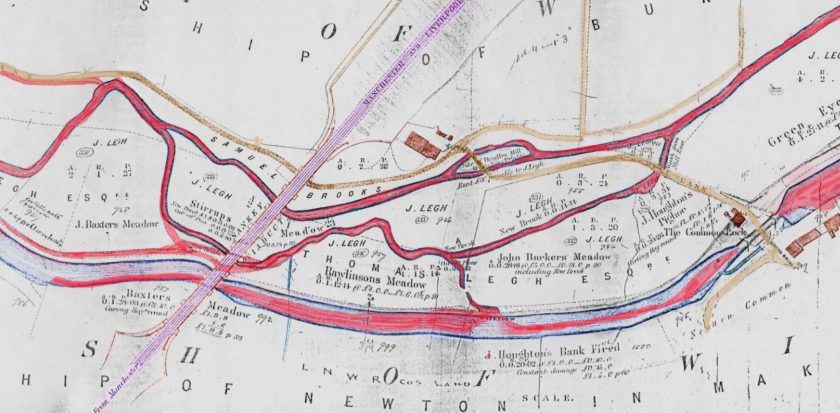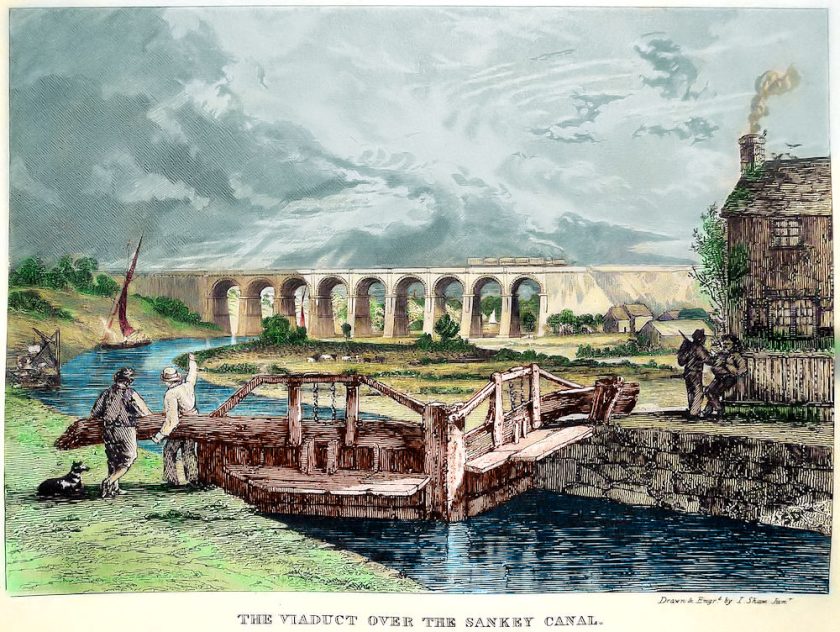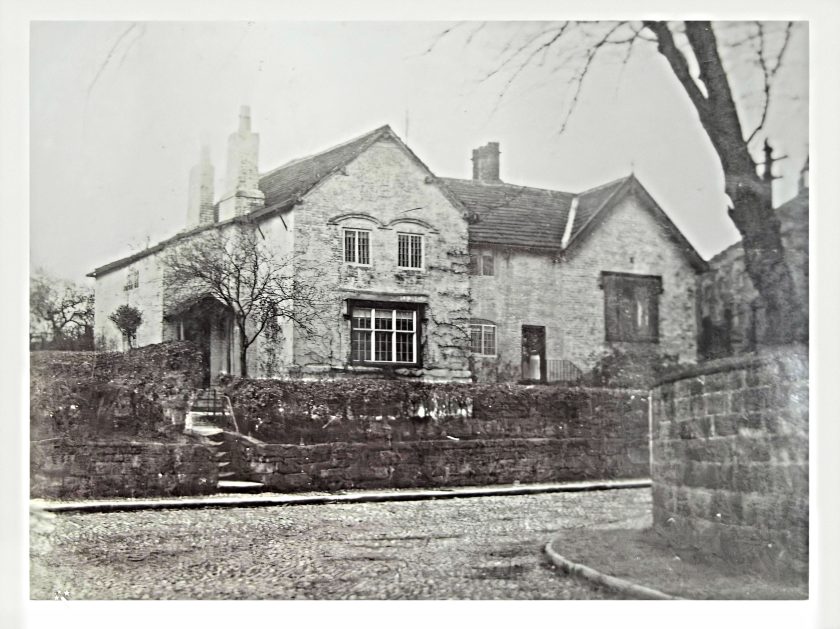I. FULL sixty years ago, a pretty vale
(Now hidden neath the waters of the lake)
Extended, in a winding course, from where
The railway arches span the road and brook,
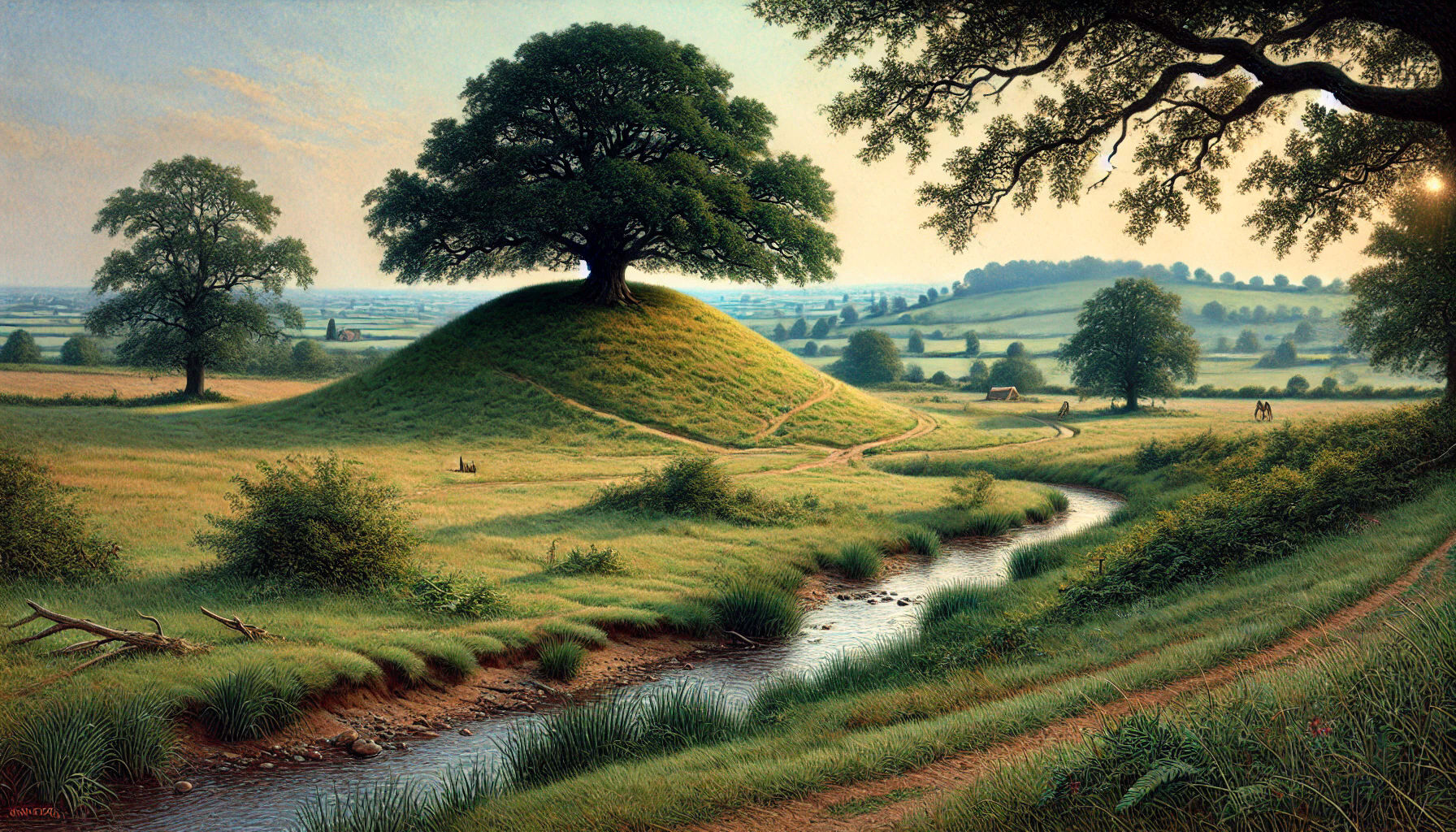
To Castle Hill, and thence, diverging, ran
Eastwards to Golborne Dale, and westwards joined
The little sylvan valley of the Dene.
Adown each vale a rippling streamlet flowed,
Which, at the hill commingling, journeyed on
Twixt flowery banks, and murmured past the spot
Where now the strong embankment separates
The winding lake and willow-shaded brook,
Until it reached the now dismantled mill,
And, through the mill-race rushing, turned the wheel
That ground the millers corn. Thence issuing,
The stream meandered on to Red Bank farm,
Where Cromwells army put the Scots to flight
What time the Civil Wars made streams of blood
To flow throughout the land ; then glided on,
Past sainted Oswalds favoured seat, to lose
At length its waters in the Merseys tide.
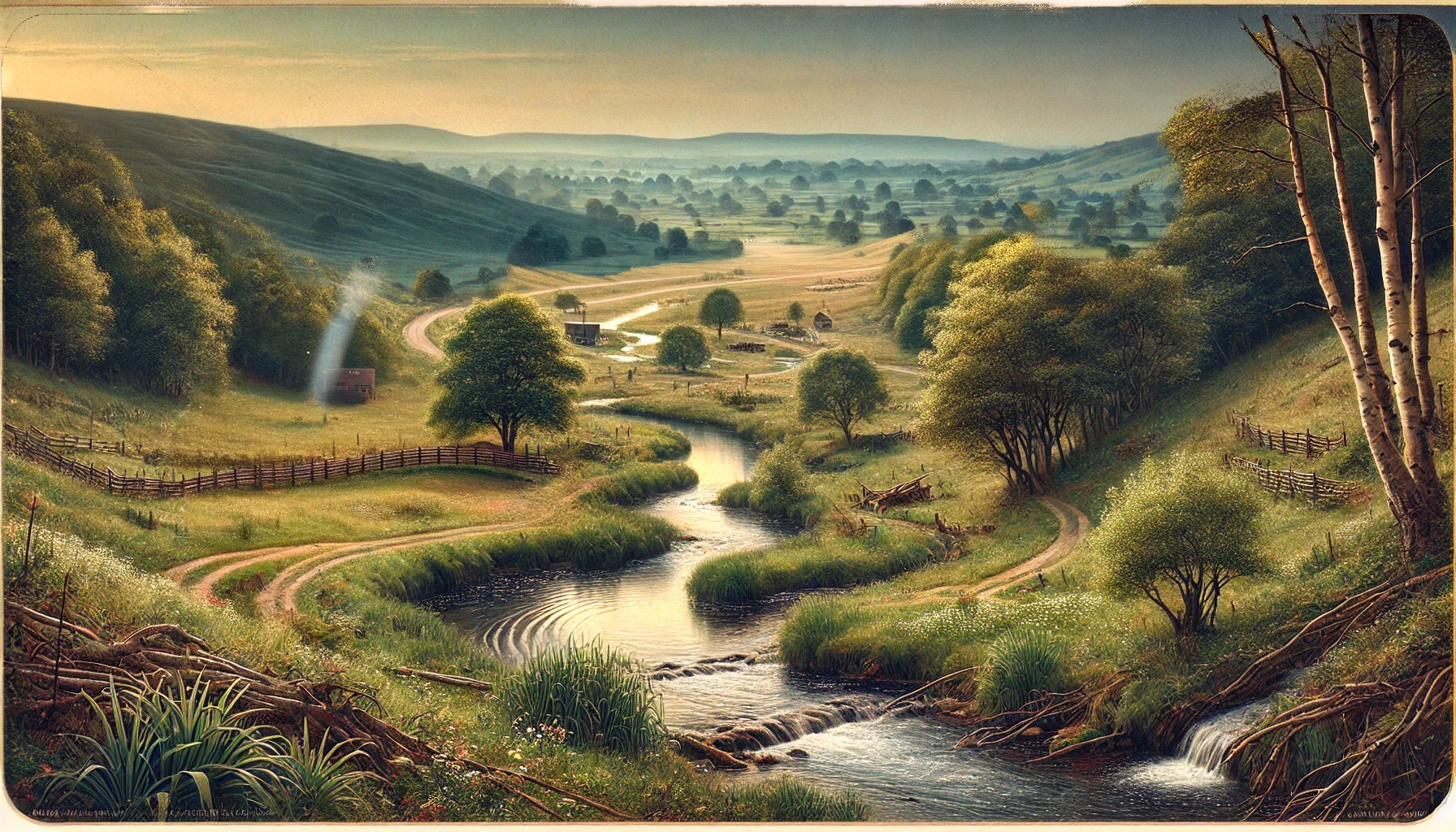
Along this pretty vale (so ancients tell)
The villagers, on summer eves, would stroll
To Castle Hill, and there, beneath the oaks,
Would sit and listen to the throstles lay
Or trill of lark ascending to the skies ;
And also there the country swain would make
His loving plaint to maiden at his side.
But soon a change came oer this lovely scene?
Full many a load of boulders, wood, and clay
Was tumbled in the vale, and slowly rose
The strong embankment now with trees and shrubs
And many-coloured rhododendrons crowned.
The noise of woodmans axe and falling trees
Resounded through the dell ; the willows tall
(Which gave the little town its pretty name)
Were felled; the stream oerflowed its banks and clomb
The valleys sides ; and, to ! the lake was made.
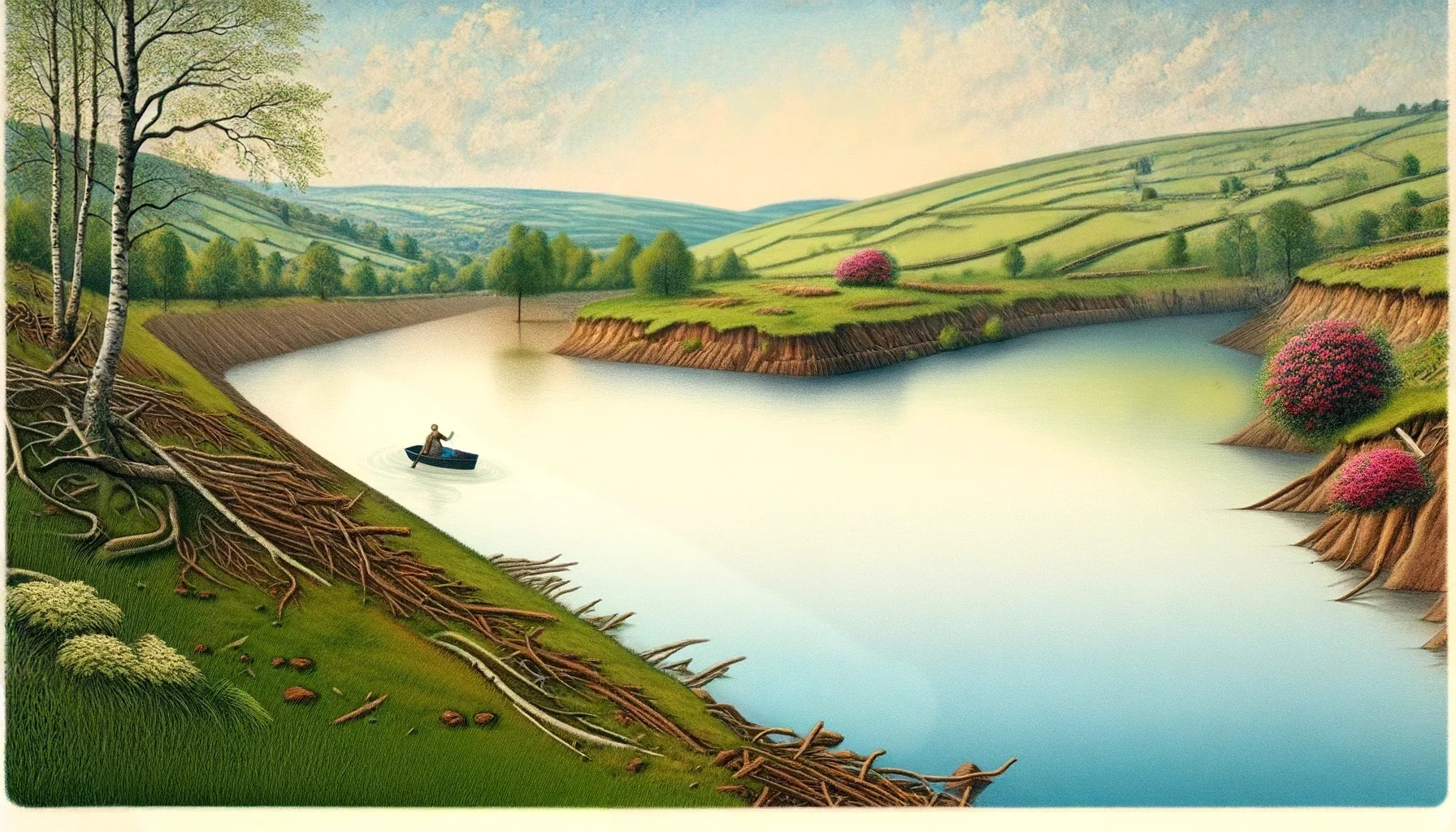
But, ere the embankment settled firm and strong,
Torrential rains descended, and the lake,
In swollen pride, high oer the outlets dashed,
Ploughing a channel through the quaking dam;
Whilst apprehension filled the little town!
Then suddenly the rainy torrent ceased,
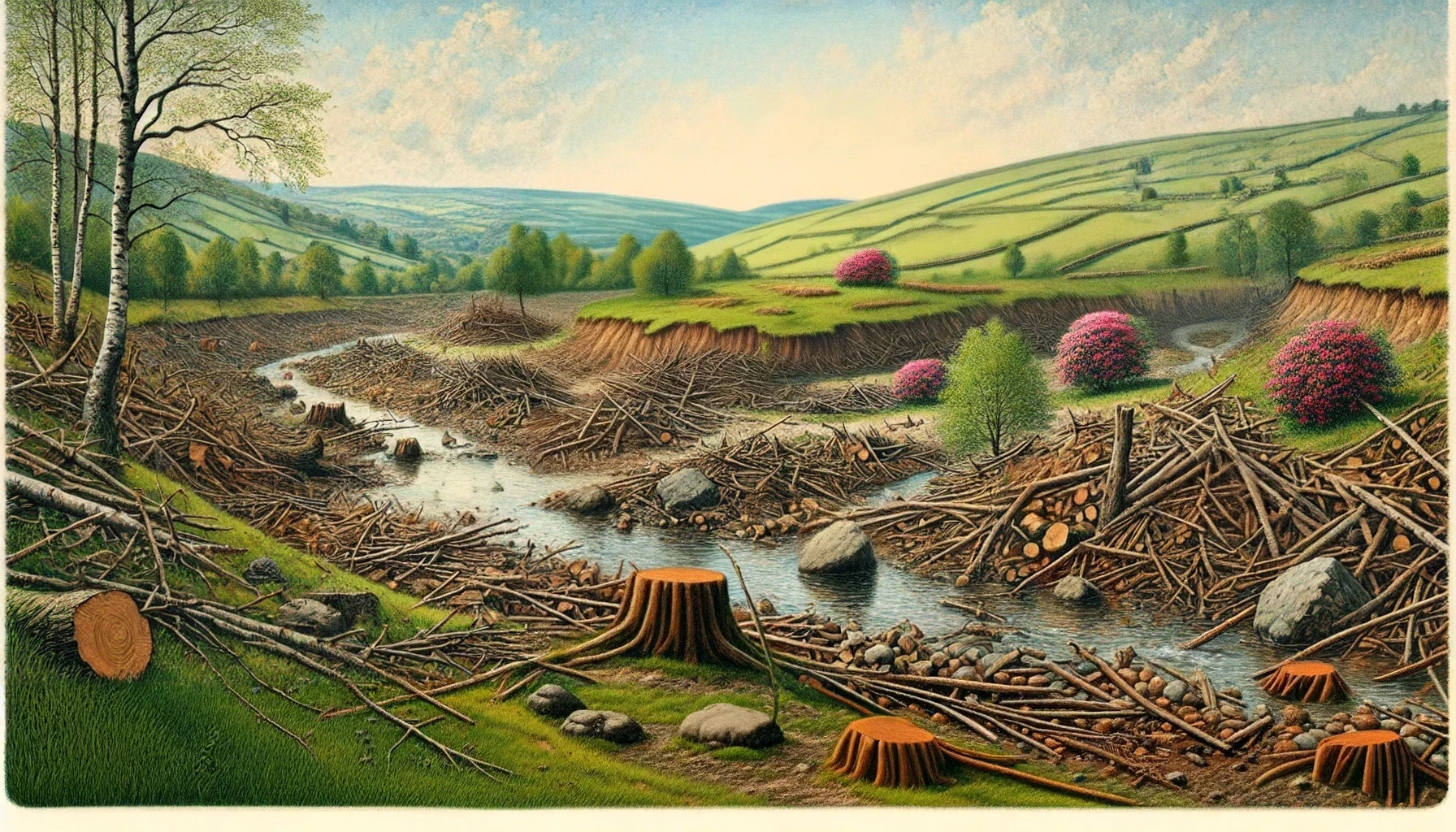
The lake subsided, and the breach was closed.
Then with the finny tribe the lake was stocked?
The dace with silvery scales, the prickly perch,
The greedy pike, the ample-sided bream,
The gaily-speckled trout, the slippery eel,
And little rounded gudgeon found a home
Within its waters, and fast multiplied.
The lake became well known for miles around,
And many a goodly catch of fish repaid
The anglers silent watch and patient skill.
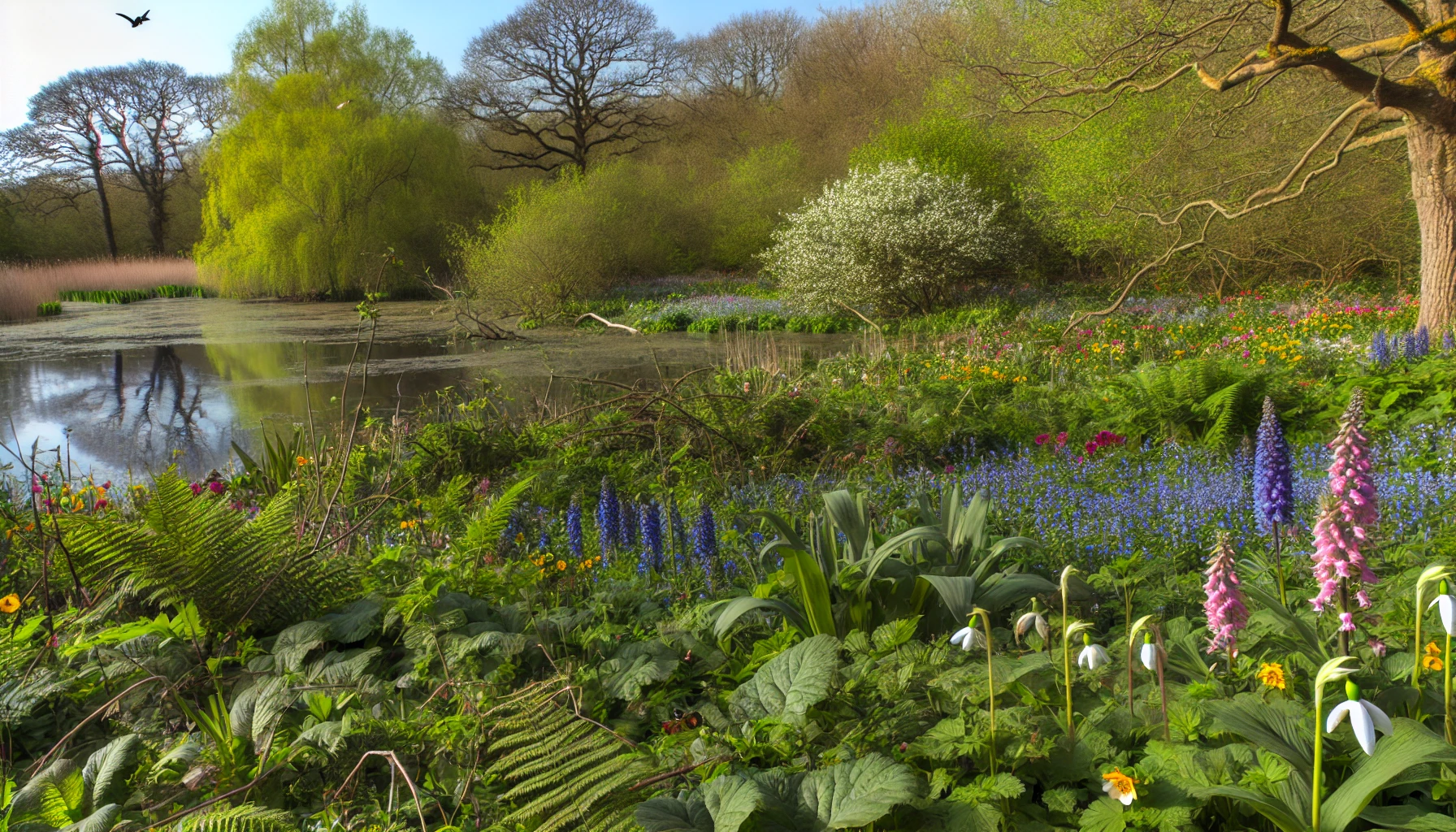
The banks were pleasantly diversified.
With leas and little woods, in which the oak,
The beech, the sycamore, the birch, the ash,
The willow, rowan, thorn, and cherry-tree
In season flourished. Scattered here and there,
The modest primrose nestled near the fern,
Whence dewy eyes of violets shyly peeped;
And hyacinths an azure carpet spread
Beneath the beechs verdant canopy;
The foxglove reared its stately stem aloft
Bedecked with drooping bells of pinky hue;
And hawthorn white its fragrance shed around;
While from the edge, the brambles spreading shoots,
With snowy bloom arrayed, oerhung the stream,
To change in time to luscious jetty fruit.
All in the trees the feathered songsters sang?
The mellow-throated blackbird poured its lay;
The speckled-breasted throstle loudly piped;
The linnet and the chaffinch gaily chirped;
The robin and the sparrow swelled the choir,
And murmuring bees the harmony enhanced.
From intervening meadows larks arose,
Their throats aquiver with sweet melody;
And, hidden in the beeches of the park,
A colony of rooks did loudly caw;
The kingfisher, with undulating flight,
Skimmed oer the placid surface of the mere ;
The dusky martin made its summer home
Within the sandy burrows of the delf;
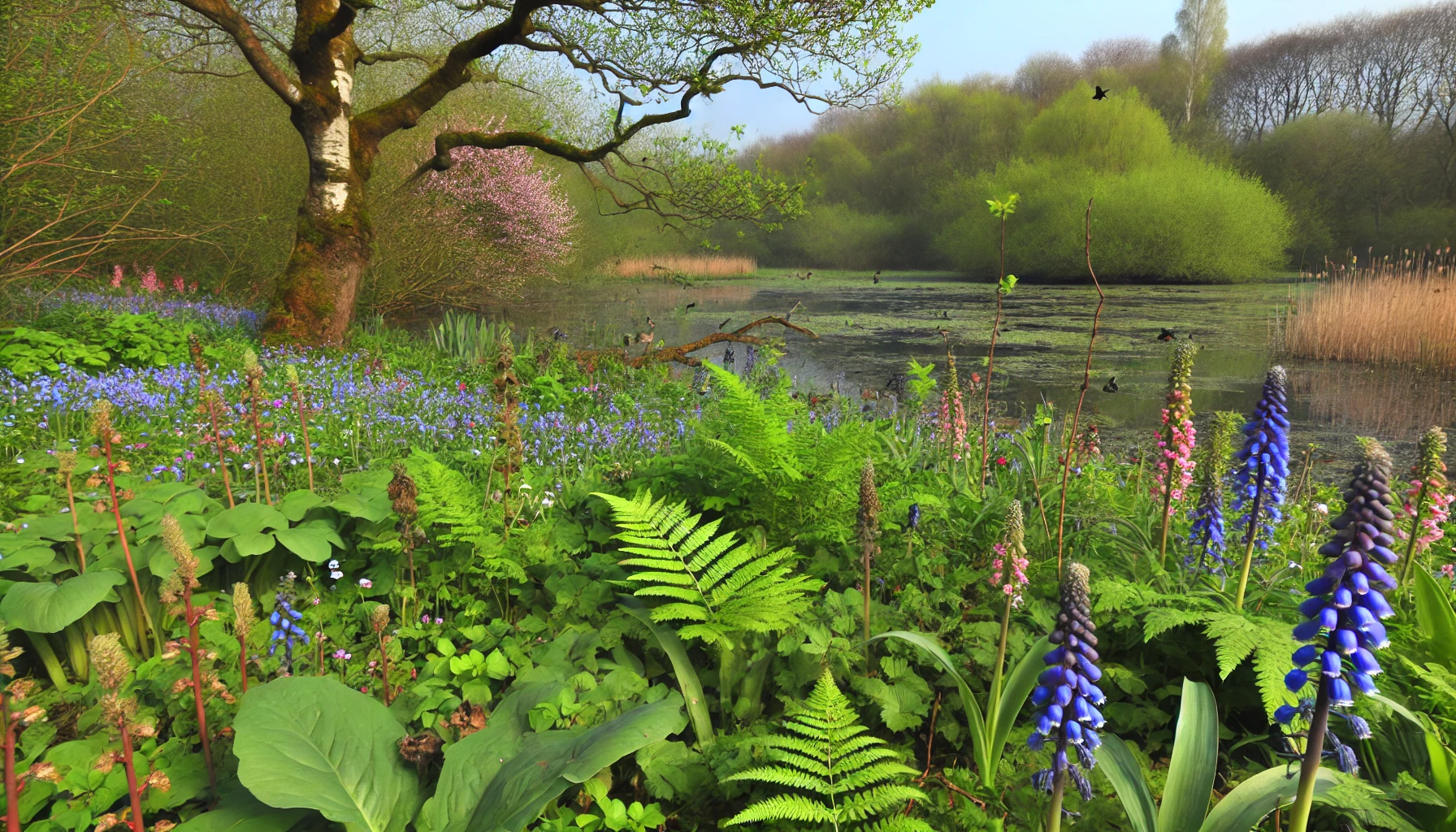
The swallow sought the shady nooks where flies
And gnats did most abound, and filled its crop
For callow offspring neath the cottage eaves.
From mong the rushes by the water-side,
The water-hen forsook her reedy nest,
And, with her brood of little fluffy chicks
Disporting in her wake, she fearfully
Set out upon her journey down the mere.
In unfrequented nook, the heron stood,
All silent and alert, ready to strike
The finny prey that rashly ventured near.
The swans, with arched wings, sailed proudly oer
The rippled deep, their stately, snowy forms.
Reflected in the limpid wave; and ducks,
With sallow broods surrounded, sought the reeds
And water-flags in quest of insect food.
From ferny covert near the hill, the cluck
Of startled pheasant smote the ear, and soon,
On whirring wings, she sped across the mere,
Fast followed by her brighter-plumaged mate,
To disappear among the bracken green ;
While from her burrow nigh the spreading thorn,
Whose snowy blossoms scent the morning breeze,
The timid, weasel-fearing rabbit stole
To feed upon the fragrant clover-buds
Or gambol with her young on daisied lea;
And neath the jutting margins of the lake,
The water-rat all unmolested roamed
In search ,of fish or anglers fallen bait.
Soon pleasure-boats were placed upon the lake,
And parsons with their Sunday-schools and choirs
Came picnicking from all the country round,
And sweetly sang their choruses and hymns;
And many a pleasant afternoon was spent
By friends on visit to the villagers,
Which brought no little trade into the town.
Such were the sights and sounds on Newton Lake,
On summer days, some fifty years ago ;
And then, on winter days, when Boreas
With icy breath had frozen all the lake,
How gaily rang the voices of the lads
And lasses as they skimmed the slippery floor!

II. And now, my fair one, come along with me,
And let us step into this little boat,
And, while you take the tiller-lines and steer,
Ill take the oars and row you round the lake,
And tell you stories of my youthful days,
When with my mates I strayed along its banks,
Across its surface sped with sail and oar,
Or bathed and angled in its waters deep.
Now, as we leave the little stage behind,
And point the prow towards the willowed brook,
Well notice on your right the meadow green.
T was here the little fleet of boats was kept
Upturned in winter. In the centre grew
A sturdy oak, round which a rope was lashed
That held a block to draw the boats ashore.
One autumn day four lads were busy there
Hauling the boats up high upon the bank,
And as they hauled the rope broke suddenly,
Precipitating two into the lake,
Whence they emerged, all dripping and subdued,
To scamper home and change their wet attire.

A little further on, and we have gained
The overflow?a well both wide and deep?
Down which, in time of flood, the water falls
And rushes through a tunnel, underneath
The strong embankment, to the brook beyond.
Upon the northern side two shafts appear,
With winding apparatus at the top
To raise an iron cover at their base
And liberate the water from below.
From these two upright shafts, some years ago,
A sloping bridge extended to the bank,
Oer which, when floods prevailed, the keeper walked,
With iron key, to raise the heavy door.
The bridge is gone, the heavy door is jammed
And rusted in the grooves, and so the lake,
From month to month, a higher level keeps
And cannot be reduced as heretofore.
Once, in the rainy season, when the lake
Was pouring deeply oer the outlets brim,
Two lads had ventured near, when suddenly
The current drew full half the boat across
The yawning gulf. In fear they climbed the bow
And scrambled on the bridge ; then, landing, ran
To tell the. keeper of the accident.
He, in a larger boat, with man and rope
Drew near, and fastening the rope astern
The imperilled craft, with strenuous oar pulled back
The boat that, left, might soon have toppled oer.

With lingering oar, now glide we by the darn,
And drink the breeze so redolent of bloom
Of white and crimson hawthorn and of shrub.
Soon we have reached the feeder of the mill?
A narrow tunnel running through the darn,
The mouth concealed by a heavy door
Set in a wooden frame, with winding gear
To lift or drop to suit the millers need.
Hard by a passage led into the road,
Where trippers often landed from the boats
To gain the station by.a shorter route.
And here my theme demands a sadder note
To claim your tender-hearted sympathy,
For near a love-lorn maiden drowned herself.
Ah me! t is two and forty years ago
The deed was done that moved the town to tears !
Not far removed a village damsel dwelt
In service with a kind old widower
And maiden relative. She happy seemed
Until she met a youth, who courted her
And her affections won. But she was told
That he was false and wooed another maid ;
And this so preyed upon poor Lizzies mind,
She sought to end her broken-hearted life.
She first a letter to her mistress wrote,
In which she told her grief and her intent,
And one to him whom she so dearly loved,
And then, in darkness, plunged into the lake.
The brook was vainly dragged, and then the mere
Was tried, and hereabouts the maid was found
With clenched hands and high uplifted arms,
As though her latest act was that of prayer.
With decent care, she in a cart was laid
And slowly taken to her childhoods home ;
And, as the silent form was borne within,
What words can tell the parents agony !
Come, dry your tears, and let as onward move
To other scenes! Upon the bank, above
This tiny bay, the little son of him
Who built the stately mansion on the cliff
Was one day fishing in the lake for pike,
And, as he drew the spinning bait ashore,
A sturdy fish from out his lair rushed up
And seized it. Then the fight began. The pike,
Well hooked and smarting, darted to and fro,
While gaily spun the reel till all the line
Was out and taut. The lad held bravely on,
But for a while the fish did stronger prove,
And pulled him from the bank into the lake.
At length the fishs efforts ceased, and then
The lad, with rod oer shoulder, dragged the pike
Behind him up the field into the house,
Where he received the praise that was his due.
A few yards onward, where the sloping cliff
Dips to the level of the flowery mead,
Once stood a donkey-house?used years ago
By two young fellows as a dressing-room !
You smile! But listen to the story first!
Two worthy scions of a noble race
Oft hither came to sail a little boat
Equipped with canvas, and a heavy stone
As ballast underneath the middle thwart.
And what more joyous, healthy sport than this-
To scud before the wind with bellied sail
On even keel ; or, tacking oft, to skim
The lake with starboard or with larboard list!
From Castle Hill they sped before the gale,
And, passing Redclyffe, tried to tack across,
When suddenly a stormy gust oerturned
The little craft and tossed them overboard.
The heavy ballast sank the little boat ;
But the young fellows quickly swam ashore,
And rushed into the donkey-house, and turned
The shaggy tenant out. Their sorry plight
Was told unto the lady of the house,
Who sent her husbands long-discarded clothes;
And there they doffed the wet and donned the dry.
With grappling-irons the little boat was raised,
And, after, ploughed the lake for many years.
Yet other scenes demand our notice here :
See where the sandy soil above the cliff
Is thickly honeycombed with tiny holes!
And see the martins darting in and out
In loving tendance on their progeny !
Now let us rest betwixt these little isles,
Whereon the ducks did nest and hatch their broods,
And view the quarry whence, methinks, was hewn
The stone to build the chapel that once stood
Where stands our noble church upon the hill.
The chapel then the name of “Rokeden” bore?
That is, “a rocky valley filled with trees,”
Which fittingly described the ancient vill
Built on the borders of the rocky dene.
When I was young, this stony delf was kept
A trim parterre, with flowers of many hues?
The haunt of bird and bee and butterfly.
And when, in prentice days, I studied
French At evenings with a local dominie,
In reading “Teleuiaque” by Fenelon,
I pictured in my mind this fairy scene
As beautiful Calypsos island grot !
A few more strokes, and presently we reach
A spot where, when the lake was drained to build
The archway oer the brook at Golborne Dale,
We youngsters found a spacious mussel-bed ;
And much we wondered whence these mussels came,
And why so many in the lake were found.
Now, let me pull across this narrow creek,
And skirt the bank of leafy willow-trees ;
And soon we round a shallow point whereon
A parson with some ladies ran his boat,
And knew not how to float her off again.
With oar in hand, he stepped into the bow
And pushed with all his might, without avail.
At length he called for help, and then was told
To get into the stern, which done, the boat,
With lightened prow, slipped off the shallow point?
Which long thereafter bore his name of ” Brown.”
Along this bank, how oft, in schoolboy days,
With silent oar I ve rowed thee, Doctor I,eete,–
Thou ruthless slayer of the greedy pike !
With memorys eye I see thee now, erect,
Alert, with rod in hand, ready to strike
Did but the tip of tail or fin appear.
I see the fishs splash as, pricked, he darts
From right to left, then downward plunges ;
And hear the music of the spinning reel
As, yard by yard, the line unwinding speeds !
Thou lettst him run his reckless, mad career,
Knowing full well his struggles soon will cease.
I hear thy voice, “Unship your oars and lay
Them in the boat ; stand ready with the net!”
With tightened.line thou drawest him to the boat,
And soon the great twelve-pounder lies full length
Beneath the thwart. ” Put back to land!” thou sayest;”
And I will pack him up, and send him off To
Disley as a present to the Squire ! ”
We gain the field betwixt the little woods,
Directly opposite the southern end
Of that small wood which runs to Castle Hill.
How often we have rested on this bank,
In swimming over from the other side,
Before we crossed again to dress ourselves!
In fancy I can see their faces now
The faces of my mates of long ago.
Where are those happy lads whom once I knew?-
A few are settled in Canadian wilds ;
And some departed to the larger towns
To win their way to fame and opulence ;
Whilst two or three have joined the vagrant train
And wander seeking work from town to town;
A few are sleeping in the churchs shade,
And others drifted far beyond the ken
Of anxious friend or grieving relative.
Such changes Time hath wrought with those I knew.
The noisy plash of oars hath frighted now
The water-kingfisher with vest of blue.
Quick ! note his waving flight as on he wings
To settle in you hyacinthine bloom !
He sallies forth alone, perchance to lure
Us from the spot where, on her tunnelled nest,
His duller-vested mate serenely sits.
We pass along this wooded slope, and soon
We gain the eastern turn to Golborne Dale.
Ha! what is this dense mass that blocks our way?
This pleasant reach of water once was clear
Of all this filthy mass of mud and weeds;
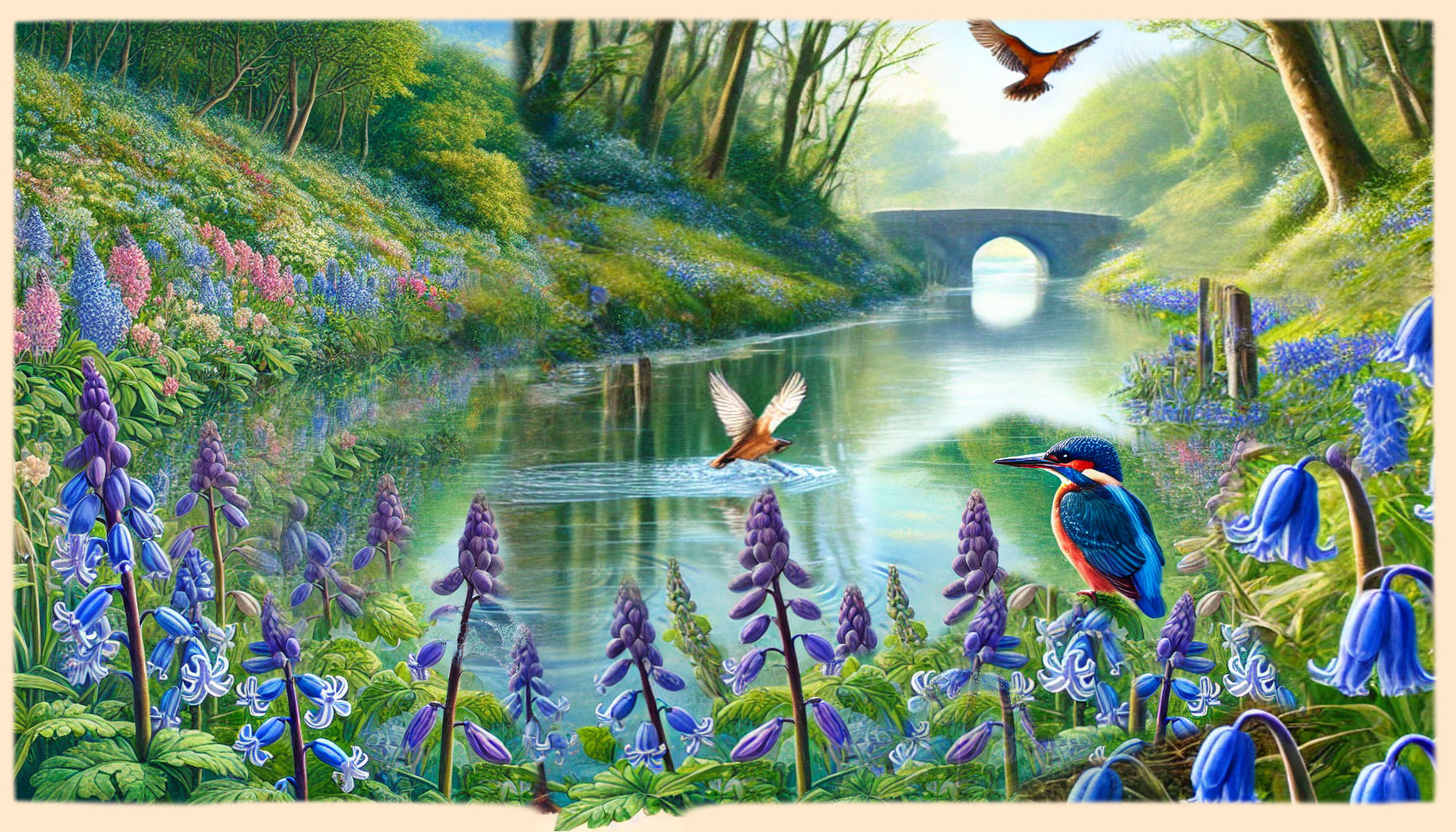
But let us disembark, and stroll along
The southern bank as far as Golborne Bridge,
And I will tell you how the lake was spoiled.
The time the lake was made, a limpid brook
(Yclept ” The Millingford “-) meandering flowed
From north of Ashton; past the Golborne mills,
Under the railway arch, into the lake.
The brooklets bed was deeper then than now,
And often I have pushed my boat beneath
The arch, emerging at the Golborne side.
The brook was stocked with fish, and many a creel
Was filled there from in olden days; but now
The water of the brook is foul and black,
In which swims nought but fever-spreading rat.
First boiling water from the Golborne mills,
At intervals, was turned into the brook,
Which killed the fish full half-way down the reach.
Yes, bream and dace and perch and little pike,
In dozens, I have seen, parboiled, upturned,
And floating there?to be devoured by rats!
This flushing of the brook brought down the mud
And sediment into the lake ; then mills
And works along the brook contributed,
Unchecked, their refuse to the muddied stream;
Then, thirty years or more ago, a cry
Against the lakes pollution roused to action
Our board of Makerfield Commissioners.
Forthwith a deputation was arranged
To sail the lake from end to end, and sniff
The water here and there, and samples take
For test by chemical analysis;
And then the matter slept, to be aroused,
From time to time, to fall asleep again!
Retrace we now this path along the bank,
And note, with gladdened eye, yon noble beech
With boughs depending oer the sullied stream.
Think you, my dear, that Nature eer designed
Those beautiful light-green serrated leaves
Should shade the waters of a sewage-farm ?
Ah no ! The stream was once so pure and clear
That you could see the pebbles in its bed.
I still remember well, one summer noon,
Repairing here to angle for the perch,
And, such the clearness of the stream,
I saw The fishes ope their mouths to seize the worm !
And note that cutting in the stony bank,
Just large enough to hold a boat for two ;
T was called ” The Lovers Nook “; and I have seen
Some charming pictures in that little spot,
The while the laughing ripples lapped the boat;
But now the slimy waters cannot lap,
Or sing their erstwhile pleasing melody
To happy lovers in the shady nook !
Anear this nook was once a fenced pool,
Wherein, in summer-time, the farmer washed
His fleecy flock ere they were sheared for wool;
To-day no farmer comes to wash his sheep?
The fence is vanished and the pool is dry.
Give me your hand, and let us re-embark,
And I will row along this northern bank.
Here note the little passage through the trees,
With steps to mount into the field above.
A stage was here, to which was locked a boat
Belonging to the tenant at the hall.
Above the steps was erst a pebbled road
Which crossed the valley, either side the stream,
And pointed towards the early British town
Of Lowton in the east. A little on
We pass the boat-house built into the lake,
And row beneath the pretty bridge which leads
To Golborne Hall. Still on we glide along
These tall ancestral trees, wherein the rooks
Have made their dwellings long ere we were born.
And view with pride this pretty sylvan scene
Which stretches hence unto the dam above!
We reach the brook that runs from out the dam
And empties in the lake. Those bulrushes
And waterflags have been the nesting-place
Of swans for many years, yet, strange to say,
No cygnets have been seen upon the lake !
Oh ! mark, my dear, as round we turn our craft,
That lovely bank of hyacinths in bloom,
Beside that gnarled oak which hath withstood
The stormy blasts of nigh a century.
There have I found the cowslip and the primrose,
When, as a boy, I roamed these fields among.
We pass beneath the bridge, and stay a while
At Castle Hill, on which one tree is seen,
Where formerly ten venerable oaks
Twined mighty branches round its verdant crest.
The hill has lost its past rotundity,
For seventy years ago its grassy sides
Were tunnelled, and straight downward from the crest
A shaft was sunk into the level mead ;
And there the miners found a chamber small,
Half-circular in form, wherein were laid,
On little tiers of oak, the calcined bones
Of one deemed worthy honoured sepulture.
T is said a ghostly lady clad in white,
At midnights witching hour or twilight gray,
Was seen to flit all silently around
The barrow old ; but since the sacred spot
Was desecrated by the pick and spade,
Her nightly flittings round the hill have ceased.
Beneath the hill, where late a withered oak
Oerhung the lake, a rocky cave was scooped,
Which bore the name of Robin Hood, the bold.
With sturdy pull and feathered oars, we glide
Beside this sloping bank of rugged oaks,
Whose withered limbs proclaim their hoary age.
The hedge that fenced it from the level field
Has been removed. How often I have scanned
This hedge in search of nests, and from the bank
Have culled the wilding flowers that grew below !
We skim along the dipping meadow land
And reach the little creek of rushes tall?
The home of amber-headed dragon-flies.
A copious stream of water from the drains
Of many fields here flowed into the lake,
At which the fishes found a feeding-place
A spot well known to village fishermen.
A few more yards, and we have gained the place
From which we started just an hour ago ;
And, as I help you land, may I express
My thanks for your delightful company,
And hope my musings have not failed to please !
“I once or twice explored the whole watercourse from the point where the three parishes of Havdock, Golborne, and Newton-le-Willows meet, near the outlet of the Dean Dam, and where there is or was a freshet or well near to the Rocky Dean and the old Dean School, down to the Golborne Dale Bridge, and often went through the tunnel under the railway in a boat with William Hicklenton, when we were both ser?geants in the 73rd Volunteers, out of which we went to the Rifle Range, which we had both assisted to make, and notably the earthwork at the top of the ravine?a work that employed the whole company but a very short time. I remember that I was looked upon as an expert because I had a very sharp-edged spade and could fill a barrow in a very few minutes. After this the range on the Moss was opened, and the other discontinued because there were complaints of stray shots on the Queens highway. Exactly opposite to the Castle Hill were some cottages, but I have no distinct recollection of them, though I have of the well that stood in the brook, and into which I fell when skating after it became a lake ; indeed, there were several wells along the head of the lake, giving evidence that at some remote period this dell or dale might have been more populous than it was within the memory of man. Mr. B.
B. Glover once told me that the oldest name for this settlement known on the Estate Plans was Rocky Dean. Well, Denn (or ” deighu,” as it is pro?nounced) was the Anglo-Saxon for ” a valley ” or ” hollow,” and furnishes a reason for the newer or Newton,” which is the Danonorm name.?(See Rasks “Anglo-Saxon Grammar,” Thorpes edition.) ” Some say that dene or denne, whereof dena commeth, is properly a valley or dale. Dena silvice and the like, as drofden, or drnfden, or druden, signifieth a thicket of wood in a valley ; for drrif, or dru, signifieth a thicket of wood, and is often mentioned in Domesday. And sometimes clena or denna signifieth, as villa or denn, a toane.”?(See Coke upon Littleton “
Institutes of the Laws of England, 1794.”) I have always thought that, in the earliest
period, ” Rokeden ” was the “old town” as distinct from the “Newtown,” and may have
extended all along the Dean and Lady Hill valley, as well as downward to the Mill and up the Dale. Newton in Latin is de novel villd, in French la neuve vine. Alfreds purpose in founding the monastery of Hyde (900), first called New Minster, was carried into effect by King Edwards charter of A.D. 901. and a second, the year of his accession, A.D. 903, so that the adjective “new” as part of a name is at least a thousand years old in English history. Alfred died A.D. 901. ” Their fortresses or towns consisted in the natural defence of impene?trable forests.”?Cs. Bel. Gal. VI. I have always been of opinion that old St. Peters Church was built of stone from the dell near Castle Hill, for before the mere was formed there was quite a quarry hole there.”? Peter Mayor Campbell.
Before the lake was made, old Newtonians tell us that, midway between the embankment and the bridge, there were stepping-stones over the brook, which was shallow at this spot, and that the drivers of carts would splash with them through the stream and drive up the road which came out near “The Willows” gates, rather than go round by the bridge and up what was then called Bridge-street. They also tell us that Under the spreading willow-trees The village smithy stood, which was a lock-up shop owned by one Bradshaw, and was situated on the brook side of the road nearly opposite the Tea-well. Of course, as the brook filled up the stepping-stones became submerged, and the,village swain lost the opportunity of continuing his gallantry in helping his lady-love over the stream. Our ancients further inform us that the County Bridge was in its present position before they were born. In our day the railings were placed on the bridge to prevent youthful village Blondins from walking across to the danger of a duckiiig in the brook. That there was a bridge in Newton so long ago as the commencement of the seventeenth century is attested by the subjoined extract from “The Manuscripts of Lord Kenyon,” published by The Historical Manuscripts Commission:
1633. Aug. 13. Wigan. Sir Peter Leighe, who is at Haidock, desires copies or notes of the orders made at the Sessions, for building bridges, for two or three years last past,
since the building of Newton Bridge.
“I was both in and about the smithy like every other village urchin, and with other lads
explored the whole valley up and down many a time, though the lower portion, near the Slopes, was a tangle of brushwood, where we went a-nutting, before it was enclosed and Mr. Birleys house was built. Of course, when the embankment was made, there was a popular outcry that the appearance of the whole valley would be spoiled. But first the embankment burst, owing to an unusual rainy season, and before the earthwork had time to settle, which by some was said to “serve them right” for destroying several very pleasant walks, notably one to Castle Hill.”? Peter Mayor Campbell.
Transcribed for use in the Newton le Willows Website, by Steven Dowd, from the 1914, Vol I, Newton-in-Makerfield, by John Henry Lane.

